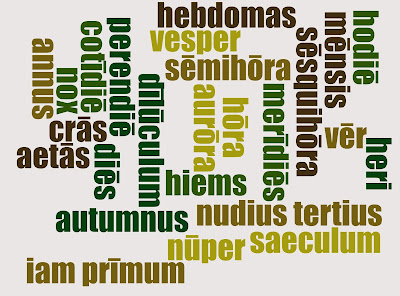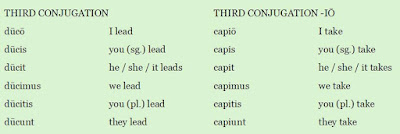Note [i] the words in bold all of which have now been discussed in depth, and [ii] the points with asterisks in the second conversation.
[1] Match the questions in [A] with the answers in [B]
[A]
[i] Quid vōs puerōs inter fēriās maximē dēlectat ?
[ii] Quid, cum Ventae Belgārum eritis, vōs maximē dēlectābit?
[iii] Nōnne scholīs at studiīs dēlectābiminī?
[iv] Num multī?
[v] Magistrīne lūdīs pilārum dēlectantur?
[vi] Num sine scientiā follis volāns geminātur et revocātur?
[B]
- Cum Ventae Belgārum erimus, per hiemem folle, per aestātem pilā dēlectābimur.
- Fortasse nōn multī.
- Inter fēriās lūdō trigōnālī maxima dēlectāmur.
- Magna est scientia follem volantem gemināre et revocāre.
- Nōnnūllī ex magistrīs lūdīs operam dant: nōn sine scientiā pila dextrā laevāque captātur.
- Nōnnūllī ex puerīs scholīs et lībrīs dēlectābuntur, sed nōn omnēs.
[2] Match the answers in [A] with the questions in [B]
[A]
[i] Nōmen eī fuit Antōnīnō Piō.*
[ii] Eī quī illud vāllum aedificāvit nōmen fuit Hadriānō.*
[iii] Hominēs contrā quōs Agricola in Calēdoniā bellāvit Pictī fortasse fuērunt.
[iv] Collibus in quibus victōriam magnam reportāvit nōmen fuit Montī Graupīō.*
[v] Vēra est; nam haec est fōrma nōminis quae in librō Tacitī dē vītā Agricolae stat.
[vi] Nōmen quod nōs hodiernī illīs collibus damus falsum est.
[B]
- Cūr, igitur, nōs hodiernī collēs Grampīōs vocāmus?
- Quī hominēs fuērunt contrā quōs Agricola in Calēdoniā bellāvit ?
- Quid fuit nōmen collibus in quibus victōriam magnam reportāvit?
- Quid fuit nōmen eī quī vallum inter Clōtam et Bodotriam situm aedificāvit ?
- Quis vallum illud magnum aedificāvit, quod inter Luguvallium et Segedūnum situm erat?
- Vērane est haec fōrma nōminis?
*nōmen + the dative case of a specific name
You already know that [i] the dative case + [ii] esse can be used to express possession, and whatever is possessed is in the nominative case:
[i] Mihi [ii] est liber [nominative]│ literally: [i] to me [ii] (there) is a book > I have a book
[ii] Est [i] mihi domī pater │ I have a father at home
[i] Hominī cum deō similitūdō [ii] est. Literally: [i] To Man [ii] (there) is a similarity with God > Man has a likeness to God.
And that structure can be used when giving people’s names:
Nōmen [i] mihi [ii] est Mārcus [nominative] │ [i] To me [ii] (there) is the name Marcus > I have the name Marcus / My name is Marcus
Puerō nōmen est Mārcus [nominative]│ The boy’s name is Marcus
The name of the person is in the nominative case just like any other noun that is ‘owned’. However, in the Sonnenschein text, a feature is used whereby the actual name of the person / thing itself is also in the dative case. Both the nominative and the dative of the name are possible.
Note how the dative case is being used to express the specific name in these examples from the entire text:
(1) [i] Eī … nōmen [ii] fuit Hadriānō [dative]. │ Literally: [i] To him [ii] was the name ¦ Hadrianius > He had the name / his name was Hadrian.
(2) Nōmen [i] eī [ii] fuit ¦ Antōnīnō Piō [dative] │ Literally: [i] To him [ii] was the name ¦ Antoninus Pius > He had the name / his name was Antoninus Pius.
(3) Nōnne [i] tōtī īnsulae nostrae nōmen [ii] est ¦ Britanniae ? │ Literally: Surely [i] to our whole island [ii] there is the name Britannia? > Surely our whole island has the name / is called Britannia?
(4) Portus celeber hīc erat, [i] cui nōmen [ii] erat ¦ Portuī Rutupīnō [dative] │ Literally: There was a famous port here [i] to which [ii] was the name Portus Rutupinus > There was a famous port here which had the name / was called Portus Rutupinus.
(5) [i] Collibus in quibus victōriam magnam reportāvit nōmen [ii] fuit ¦ Montī Graupīō [dative] │ Literally: [i] To the hills … [ii] was the name Mons Graupius > The hills in which he brought back a great victory are called / have the name ¦ Mons Graupius.
From Livy:
(1) Per idem ferē tempus aedēs Matris Magnae Īdaeae dēdicāta est quam deam is P. Cornēlius advectam ex Asiā P. Cornēliō Scīpiōne, ¦ cui posteā Āfricānō [dative] fuit cognōmen, ¦ P. Liciniō cōnsulibus in Palātium ā marī dētulerat.
About the same time a temple was dedicated to the Great Idaean Mother, a goddess whom this same Publius Cornelius, when she came from Asia in the consulship of Publius Cornelius Scipio, ¦ [literally: to whom later was the surname Africanus] > who later had the surname Africanus, ¦ and Publius Licinius, had escorted to the Palatine from the harbour.
(2) [i] Puerō ab inopiā ¦ Egeriō [dative] ¦ [ii] inditum nōmen │ Literally: [i] To the boy [ii] was given the name Egerius from his poverty. > The name Egerius was given the boy from his poverty.










